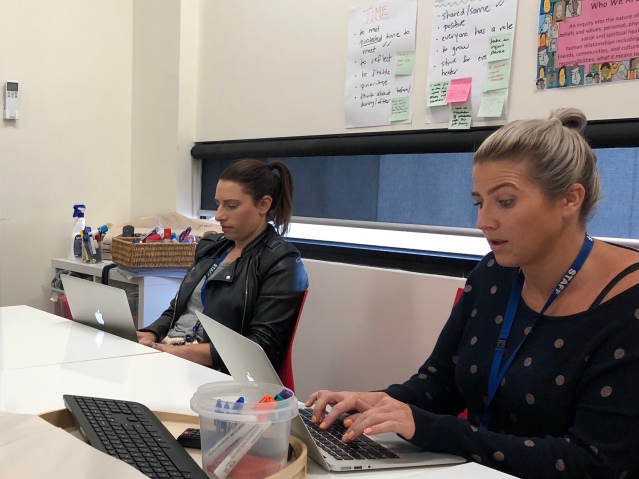‘How do bloggers find their voice?’
Joc is facilitating a meeting with a team of teachers, exploring blogging as a writing form…
‘Through their passions?’ someone asks. Taking a stance on an issue? Sharing experiences? These are some of the possibilities raised by the the group. They have all read blog posts, but not written any.
‘By writing’, someone says.
I think back to eight years ago when I first started blogging.
My first three posts, which I soon deleted, sounded as though they were written by different people, as I struggled to find a voice. It was only when I let go of preconceived ideas, stopped trying to impress an imagined audience and just wrote, that I found a voice… my own.
It’s best not to over think or over plan. Try not to agonise over whether your writing is good enough. Write, check, publish, done. You can always write another post when you’ve developed your thinking further or changed your perspective. Just write. A lot. Or you will never find your voice.
‘Now write’ says Joc. She has provided links to some mentor texts (blog posts) and wants the teachers to experience this themselves, before they ask it of their students. Initially there is resistance. Anxiety even? Realisation dawns that this is what our students experience every day and our awesome teachers throw themselves willingly into the learning pit…

And this is Megan’s take:
Today I was asked to just write for 30 minutes…. Easy right? Go for it? Ummm no, I thought…
About what? Where do I get my ideas from? Geeze….is this how I make the children feel when I say…”Just write about whatever you want” Do they freeze up like me?
How am I meant to encourage children to be authors and find their voice, if I am unsure of how to find my own? I have never seen myself as a ‘writer’ but find such contention with this because I know how important it is, as a teacher, to model to the children, to show them different styles of writing, to show them what it might look like to take a leap and enter the world of being an author!
Have I ever written something as an author? I really can’t say. I have recorded my opinion while listening to someone speak…Is that being an author? I have modelled story writing with the children in class…Is that being an author? I have written my reflection or opinion on things…Is that being an author? I write questions to my children in response to their learning…Is that being an author? Perhaps I am just a little unsure of what being an author ‘looks like’ or perhaps I just lack the confidence in my own skills to ‘have a go’. I encourage that ‘growth mindset’ with children everyday, yet haven’t been able to apply it in my own world. Why?
If I really think about it, I am a writer everyday, I just don’t put my words in to writing.
My younger sister recently had a career change from Lawyer to Transformational coach – what a huge leap of faith she took. And, while following this niggle has lead to great things, she has also come across road-blocks when it comes to writing and expressing her voice. Being new into the industry she feels her voice isn’t valued or worth something…yet! And although she has felt this way she has realised that it is the only way to share her feelings to have her voice heard and to inspire people…so she did it!! She writes blogs, facebook posts, reflections, coaching seminars, she uses anything she can to share her passion and her voice. She was terrified…she didn’t know how it would be received….but she did it!
So……really I am just being a big wuss…look out blogging world, I am coming in hot!



 Image:
Image: 







